完整六年级英语语法专项练习
六年级英语语法练习题40题(答案解析)

六年级英语语法练习题40题(答案解析)1.There are many _____ in the classroom.A.studentB.studentsC.student'sD.students'答案解析:B。
选项A“student”是单数形式,题目中“many”表明要用复数形式,所以 A 错误。
选项C“student's”是所有格形式,表示“学生的”,不符合题意,错误。
选项D“students'”也是所有格形式,错误。
选项B“students”是复数形式,符合题意。
本题考查名词复数形式。
2.This is my _____ book.A.sisterB.sister'sC.sistersD.sisters'答案解析:B。
选项A“sister”是“姐妹”的意思,不是所有格形式,错误。
选项C“sisters”是复数形式,不是所有格形式,错误。
选项D“sisters'”是复数的所有格形式,而题目中是“my sister”的所有格,应该用单数所有格形式,错误。
选项B“sister's”是单数所有格形式,符合题意。
本题考查名词所有格形式。
3.The _____ are playing on the playground.A.childB.childsC.childrenD.childrens答案解析:C。
选项A“child”是单数形式,题目中“are playing”表明要用复数形式,所以 A 错误。
选项B 形式错误,child 的复数是children。
选项D 形式错误,children 本身就是复数形式,不能再加s。
选项C“children”是复数形式,符合题意。
本题考查名词复数形式。
4.That is _____ desk.A.TomB.Tom'sC.TomsD.Toms'答案解析:B。
选项A“Tom”是人名,不是所有格形式,错误。
小学六年级英语语法专练(含答案)
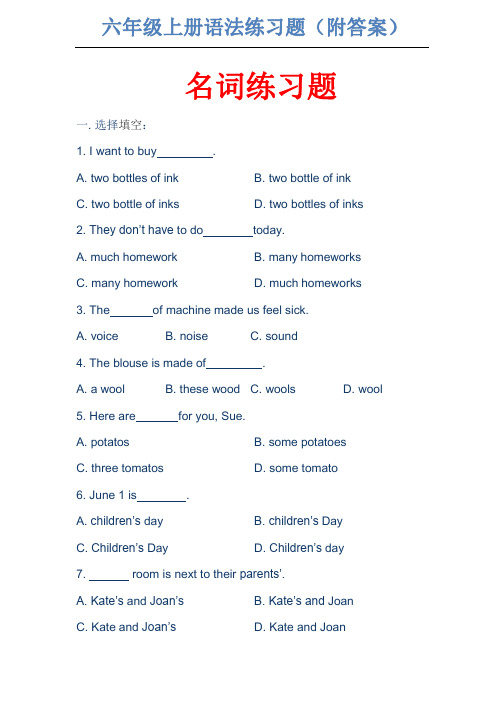
六年级上册语法练习题(附答案)名词练习题一. 选择填空:1. I want to buy .A. two bottles of inkB. two bottle of inkC. two bottle of inksD. two bottles of inks2. They don’t have to do today.A. much homeworkB. many homeworksC. many homeworkD. much homeworks3. The of machine made us feel sick.A. voiceB. noiseC. sound4. The blouse is made of .A. a woolB. these woodC. woolsD. wool5. Here are for you, Sue.A. potatosB. some potatoesC. three tomatosD. some tomato6. June 1 is .A. children’s dayB. children’s DayC. Children’s DayD. Children’s day7. room is next to their parents’.A. Kate’s and Joan’sB. Kate’s and JoanC. Kate and Joan’sD. Kate and Joan8. Miss Green is a friend of .A. Mary’s mother’sB. Mary’s motherC. Mary mother’sD. mother’s of Mary9. Tom is . He will come to see me.A. my a friendB. a friendC. mine friendD. a friend of mine10. Sheep white and milk also white.A. is, areB. are, isC. is, isD. are, are11. I’d like to have a glass of milk and .A. two breadsB. two pieces of breadsC. two pieces of breadD. two piece of bread12. It’s a long to Paris. It’s two thousand kilometers.A. streetB. roadC. wayD. end13. Many are singing over there.A. womanB. womenC. girlD. child14. He bought .A. two pairs of shoesB. two pair of shoesC. two pairs of shoeD. two pair of shoe15. Mr. White has three .A. childB. childrenC. childsD. childrens16. Beijing is one of the biggest in the world.A. citysB. cityC. cityesD. cities17. --- Where’s Mr. White? --- He’s in .A. the room 202B. Room 202C. the Room 202D. room 20218. --- Whose room is this? --- It’s.A. Li MingB. Li Ming’sC. Li Mings19. Every morning Mr. Smith takes a to his office.A. 20 minutes’ walksB. 20 minute’s walkC. 20-minutes walkD. 20-minute walk20. ---Are these ? --- No, they aren’t.A. sheepB. sheeps冠词( )1. This is interesting book and I enjoy it.A. aB.anC.the( )2. Middle school students don't need to go to school on weekends. They can go to park for fun with their parents or friends.A. /; aB. a; aC. the; aD. a; / ( )3. Nick is 8¬year¬old boy, but he can write more than 2,000 words.A. /B. theC. aD. an( )4. Bill likes playing basketball, but he doesn't like playing piano.A. the; theB./; theC. the; /( )5. Don't you know girl under the tree? She's our teacher's daughter.A. aB.anC. the( )6. new bridge has been built overChangjiang River in Huangshi.A. The; aB.A; theC.A; /D. An; the ( )7.—Do you know inventor?—Yes, he's friend of mine.A.an; theB. a; aC. the; a( )8. Lisa had egg and glass of milk for breakfast this morning.A. a; aB.an; anC. a; anD.an; a( )9. This summer, I'm going to visit Great Wall.A. aB.anC. theD./( )10.—Is Mr. Franco honest and capable man?—Yes.A.aB.anC.the( )11. In order to find better job, she planned to learn a second foreign language.A.theB.aC.an( )12. My mother is English teacher in a university in Beijing.A.aB.anC.theD./( )13.—What do you usually have for breakfast, Peter?—A fried egg, three pieces of bread and a glass of milk.A.aB.anC.theD./( )14. It's not good idea to drive for four hours.A.aB.anC.the( )15.—What does Michael look like?—He has big eyes and wide mouth.A.aB.anC.the( )16.—What do you want to be in the future, Nick?—I want to be pilot.It is exciting job.A.a; aB.a; anC.the; anD.a; the( )17. As we know, England is European country and Singapore is Asian country.A.an; anB.an; aC.a; aD.a; an( )18. Look!There is cat in the tree.A.aB.anC.theD./( )19.——“Cindy, do you have e-mail address?I want to send you some photos.”-“Yes, I do. It's *****************.”A.aB.anC.the( )20. Students usually go to school on weekdays.A. /B.theC.a代词( )1.Mr.Wang is very friendly, and like him very much.A.weC.ourD.ours ( )2.—Excuse me, are these books ?—No, they are classmate's.A.his; heB.hers; hersC.your; mineD.yours; my ( )3.—Is Miss White English teacher, Maria?—No, she teaches geography.A.your; myB.you; mineC.you; usD.your; us ( )4. Are there any differences between your idea and?A.heB.hisC.sheD.her ( )lie gave a baby cat yesterday that hurtwhen it fell from a tree.A.me; itB.myself; itselfC.me; itselfD.myself; it ( )6.—Who is the best friend of at school?—I think Helen is.We often help each other.A.mineB.hisC.yoursD.hers ( )7.—Linda, help to some fruit.—Thank you.A.youB.yoursC.yourselfD.yourselves( )8.—The pet dog in your hand is very nice.Is it _ ?—Yes, but I'll give it to my friend, Lucy, as birthday present.A.you; herB.yours; herC.your; herD.you; hers ( )9.—How was your visit to the World Park in Beijing?—Wonderful! We enjoyed very much.A.itselfB.myselfC.yourselvesD.ourselves ( )10.—Excuse me, I want to have my watch fixed, but I can't finda repair shop.—I know e on, I'll show you.A.oneB.itC.someD.that( )11.My sister has two skirts.One is yellow, is black.A.otherB.anotherC.othersD.the other ( )12.Sam looks like his Dad.They are tall.A.eitherB.anyC.allD.both( )13.—Do you want tea or coffee?—.I really don't mind.A.NoneB.EitherC.NeitherD.All( )14.—Wow!You've got so many skirts.—But of them are in fashion now.A.allB.bothC.neitherD.none( )15.—What do you think of the two backpacks?—of them are very nice.A.EitherB.BothC.EachD.All( )16.I hope I can find for my son in the shop.A.good somethingB.something goodC.many thingD.good anything( )17.All of us find necessary to take exercise every day.A.thisB.thatC.itD.them ( )18.Things made by hand are usually more expensive than produced in factories.A.theseB.thisC.thatD.those ( )19. There is wrong with my computer. It doesn' t work now. I’ll buy a new one.A. nothing.B. something.C. everything.( )20.—Do you have anything important to say for yourself?—except sorry.A.SomethingB.NothingC.AnythingD.Everything介词( )1. Lady Gaga is famous her beautiful voice.A.asB.withC.for( )2.—Jenny, will you still be here this afternoon?—Yeah, I think I'll stay five. Then I'm leaving for dinner.A.atB.inC.until( )3. I think every student should go to school , but some of them are always late.A.by the timeB.on timeC.for a timeD.at times ( )4. Linda is not good at Chinese, but she passed the exam the help of her classmates.A.withB.underC.without( )5. World No Smoking Day is May 31.A.inB.onC.at( )6. The paper is made wood and the desk is also made wood.A.of; fromB.of; ofC.from; of( )7. Don't drive so fast! We must slow down when we drive the tunnel.A.pastB.acrossC.overD.through( )8. The two kids practice English joining the English club.A.byB.inC.onD.with( )9. Lucy and I are twins, but we're different eachother in many ways.A.forB.inC.ofD.from( )10. On the way the mountain village, we found the local houses different from ours.A.toB.byC.atD.on( )11.—Jack, is maths difficult to learn in high school?—Sure. No subject can be learned well hard work.A.withoutB.throughC.byD.with( )12. In some western countries shops are closedweekends.A.inB.toC.atD.with( )13.Look at the wall.There are some pictures it.A.inB.onC.toD.at( )14.We can see a playground the two tall buildings.A.betweenB.amongC.inD.to( )15.—What time do you usually get up in the morning?—six o'clock.A .On B.For C.In D.At( )16. Linda was born July 2, and my birthday is also that month.A.in; onB.in; atC.on; inD.on; at ( )17. Both my parents were born 1970.A.atB.inC.onD.to( )18.—When will the second class begin?—two minutes.A.ForB.AtC.InD.After( )19.—Is Jack good at basketball?—Yes. basketball he is also good at table tennis.A.E xceptB.BesidesC.ButD.Beside ( )20. I go to school bus every morning.A.inB.onC.atD.by形容词和副词( )1.—Which is , the sun, the moon or the earth?—Of course the moon is.A.smallB.smallerC.smallestD.the smallest ( )2.He has made progress this term than before.A.littleB.lessC.fewerD.much ( )3.“We must keep in the library.”The woman saidto me.A.quiet; quietlyB.quietly; quietlyC.quietly; quietD.quiet; quiet ( )4.I can't get anything on TV. There must be with it.A.wrong somethingB.wrong nothingC.something wrongD.nothing wrong( )5.Linda has received that she is unable to get a job.A.such little educationB.so little educationC.a such little educationD.a so little education( )6.Many students think foreign languages are science subjects.A.more difficult asB.less difficult thanC.much difficult thanD.so difficult as( )7. the temperature is, water turns into steam.A.The high; the fastB.Higher; fasterC.The more higher; the fasterD.The higher; the faster( )8.He eats food, so he is fat.A.much too; too muchB.much too; too manyC.too much; much tooD.too much; many too( )9.—Who is Ren Changxia?—A great policewoman.She always thought of othersthan herself.A.moreB.muchC.lessD.most( )10.Kate felt when she saw the lovely dress in theclothes shop.A.pleasedB.tiredC.wellD.good( )11.Do not use so much water.It's .A.healthyefulC.wastefulD.rude( )12.Knowledge is money.But I think it is money.A.as important asB.so important asC.more important thanD.the same as( )13.—I think our chemistry teacher is working hard. He teaches us .—Yes, but he hasn't come today.He doesn't feel .A.good; wellB.good; goodC.well; goodD.well; well( )14. I read, I'll be.A.The much; the happyB.More; happierC.The more; the happierD.The most; the happiest( )15.I found he looked than last time when I went to see him.A.betterB.wellC.goodD.worrying( )16.The mother looked because her son hadn't been back.A.worryB.worriedC.to worryD.worrying ( )17.This sweater doesn't suit me.It's a bit small.Could you giveme one?A.a largeB.a largerC.the largestD.a smaller ( )18.—You have got the same shirt as I.—Yes.Mine is , but not so as yours.A.better; expensiveB.better; more expensiveC.more better; expensiveD.good; more expensive( )19.—Do you think the fish tastes ?—She cooked it , I think.A.good; goodB.well; goodC.well; wellD.good; well ( )20.—What's the matter with you?—I'm .I want some water to drink.A.thirstyB.hungryC.tiredD.sleep数词( )1. The volunteers sent books to a mountain village school on Children's Day.A.two hundreds ofB.two hundred ofC.two hundredsD.two hundred( )2.It is reported that people throw plastic bags along this street every day.A.hundredB.hundredsC.hundred ofD.hundreds of ( )3. What a surprise! It's time I've met the beautiful girl this week.A.threeB.thirdC.the threeD.the third ( )4. The teacher said that of the boys would take partin the talent show.A.three fiveB.three fivesC.thirds fifthsD.three fifths ( )5. About of the students in Grade N ine this year were born in the .A.three five; 1996B.three fifths; 1990sC.third fifth; 1997D.third fifths; 1990s( )6. of his works were written in his .A.One third; fiftiesB.One third; fiftyC.One thirds; fifties( )7. Our school is so famous that people come andvisit it every term.A.hundredB.hundredsC.hundred ofD.hundreds of ( )8. The action film has attracted millions of youngpeople to the cinema.A.130-minuteB.130-minutesC.130 minuteD.130 minutes ( )9. There are over students in their school.A.hundredsB.nine hundredsC.nine hundred( )10.—Jackie Chan has donated dollars to charity.—He is an example to us all.A.thousandB.thousandsC.thousand ofD.thousands of ( )11. Now, everybody, please turn to Page and look atthe picture.A.F ifth; fiveB.Five; fifthC.Fifth; fifthD.Five; five ( )12. My uncle bought me an iPhone for my birthday.A.twelveB.twelfthC.the twelveD.the twelfth ( )13. For breakfast, I usually have and two pieces of bread.A.a cup of milk halfB.half a cup of milkC.a half milk cupD.half a milk cup( )14.—How old is your daughter?—.We had a special party for her birthday last Sunday.A.Nine; nineB.Nine; ninthC.Ninth; nineD.Ninth; ninth( )15. Tom has just finished writing a article.A.nine-hundred-wordsB.nine-hundreds-wordC.nine-hundred-wordD.nine-hundreds-words( )16. I don't believe that this boy can paint such a nice picture.A.five years oldB.five-years-oldC.five-year-old( )17.—Excuse me, how can I get to the museum?—Sorry.It's my time to be here.A.oneB.firstC.once( )18.—Excuse me, where can I buy a jacket?—You can go to the Men's Wear Section on the floor.A.twoB.twiceC.second非谓语动词( )1. The group found it hard the job in time.A.finishingB.finishedC.to finishD.finish( )2.Why don't you let me now?A.to goB.goC.goingD.gone( )3.It's raining heavily.You'd better now.A.don't goB.don't to goC.not leaveD.not to leave ( )4.I'm allowed on Saturday.A.go to the moviesB.going to the moviesC.went to the moviesD.to go to the movies( )5.We mix the water and flour bread.A.to makeB.makingC.makeD.makes ( )6.Linda would rather than stay here.A.leftB.to leaveC.leavingD.leave ( )7.Did you watch the actor the whole play yesterday?A.performingB.to performC.performD.performed ( )8.They would really like you them.A.joinB.should joinC.to joinD.will join ( )9.There are so many kinds of MP4 in the shop.I can't decide .A.what to buyB.to buy whatC.which to buyD.to buy which ( )10.We decided our holiday in that town.A.not to spendB.not spendC.not spendingD.don't spend( )11.Lily hopes in France.A.studyB.studiesC.studyingD.to study ( )12.Some people find it easy the truth.A.to knowB.to knowingC.knowingD.know ( )13.We want the tour as soon as poss ible.A.startingB.startedC.startsD.to start ( )14.My mom had me _ a bottle of oil for her.A.to buyB.buyC.buyingD.buys ( )15.The teacher often encourages us hard.A.studyingB.studyC.studiesD.to study ( )16.The baby was made by this naughty brother.A.cryingB.cryC.to cryD. cries ( )17.It took Janet three hours reading this interesting story.A.to finishB.finishedC.finishingD.finish ( )18.My family invite you next Friday for the party.eB.to comeingD.came ( )19.It's so hot! Let's stop .A.has a glass of waterB.having a restC.to have a glass of waterD.have a rest情态动词1. Y ou stop when the traffic light turns red.A. canB. had betterC. needD. must2. — Mum, must I stay there the whole day?—No, you . You come back afterlunch, if you like.A. mustn't; canB. needn't; mustC. needn't; may3. “Whose notebook is this?”“It Jim’s. It has his name on it.”A. can’t beB. must beC. can be4. There's enough time for you to go to the airport. You hurry now.A. shouldB. needn'tC. mustD. can't5. —Mum, must I wash the dishes right now?—No, you .A. shouldn’tB. wouldn’tC. mustn’tD. needn’t6. —Is that your teacher?—That be Mr.Wang. He has gone to Japan with his wife.A. can’tB. mustn’tC. may not7.—Must I do my homework now, Mum?—. You can do it tomorrow.A. No, you needn’tB. No, you mustn’tC. Yes, you needD. Yes, you must8. ——You can hardly swim,you?——.But my mother says she’ll teach me during my summer holiday.A.can’t;No B.can;No C.can’t;Yes D.can;Yes9. —Is that your teacher?—That be Mr.Wang. He has gone to Japan with his wife.A. can’tB. mustn’tC. may not10. —Is that girl under the tree Mary?—No, that be Mary. She has gone to New York.A. canB. mustn’tC. can’t11.—Is Maria knocking at the door?—It be her. She has gone to Australia.A.may notB.needn'tC.mustn'tD.can't12. — Must I take a taxi?— No, you . It’s not far from here.A. can’tB. mustn’tC. shouldn’tD. needn’t13. -You be happy with the strong public support you‘ve received.-Yes,you’re right.I‘m really excited.A.mayB.canC.mustD.need14. Tom, you play with the knife.You hurt yourself.A. won't; can'tB. mustn't; mayC. should; mustD. can't; should15. I am not sure,he be in the classroom.A.may B.must C.can答案名词1-5 AABDB 6-10 CCADB 11-15 CCBAB 16-20 DBBDA 冠词1-5BADBC6-10BCDCB11-15BBDAA16-20BDABA 代词1-5ADDB C6-10CCBDA11-15DDBDB16-20BCD BB 介词6-10CDADA11-15AC BAC16-20CBCB D 1-5CCBAB形容词副词1-5DBACB6-10B DCAA11-15CCDCA16-20BBADA 数词1-5DDDD B6-10ADA CD11-15BBBBC16-18CBC非谓语动词1-5CBCDA6-10DCCCA11-15DA D BD16-20CABCD 情态动词1-5DC BBD6-10AA B A C11-15DDC B A。
六年级英语语法题及参考答案4篇
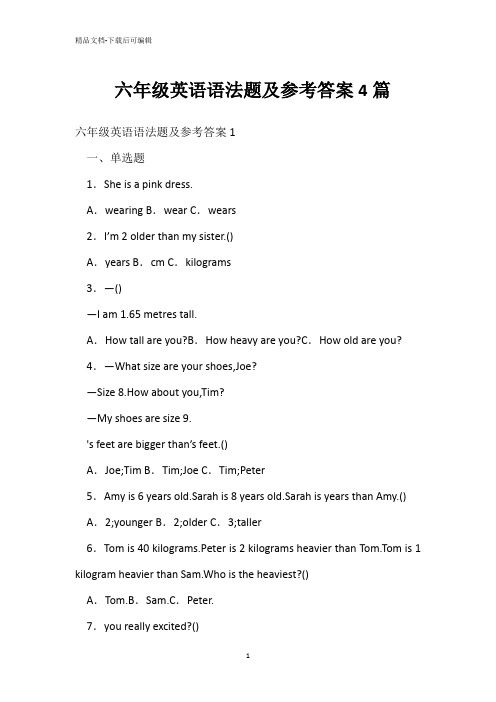
六年级英语语法题及参考答案4篇六年级英语语法题及参考答案1一、单选题1.She is a pink dress.A.wearing B.wear C.wears2.I’m 2 older than my sister.()A.years B.cm C.kilograms3.—()—I am 1.65 metres tall.A.How tall are you?B.How heavy are you?C.How old are you? 4.—What size are your shoes,Joe?—Size 8.How about you,Tim?—My shoes are size 9.'s feet are bigger than’s feet.()A.Joe;Tim B.Tim;Joe C.Tim;Peter5.Amy is 6 years old.Sarah is 8 years old.Sarah is years than Amy.() A.2;younger B.2;older C.3;taller6.Tom is 40 kilograms.Peter is 2 kilograms heavier than Tom.Tom is 1 kilogram heavier than Sam.Who is the heaviest?()A.Tom.B.Sam.C.Peter.7.you really excited?()A.Do B.Are C.Will8.Keep on Chinese in the UK.()A.practise B.practising C.to practise9.I’m going to study History my new friends.()A.in B.with C.to10.—Are you going to middle school this September?() —Yes,I’m excited.A.read B.real C.really11.We’ll always be.()A.friend B.friends C.the friend12.—I’m going to study English.()—?A.What you B.How are you C.What about you 13.Now I can write English.()A.in B.on C.with14.It’s time go bed.()A.to;to B.for;to C.to;for15.I’m going to my bike to school.()A.by B.on C.ride16.Can we always friends?()。
六年级英语语法大全及练习
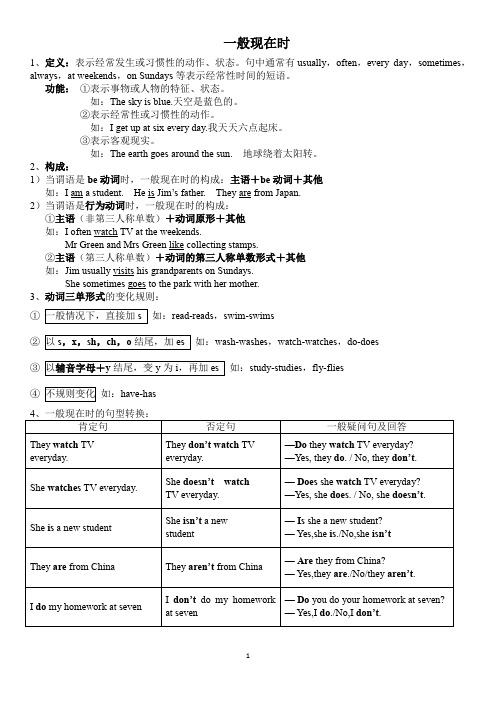
一般现在时1、定义:表示经常发生或习惯性的动作、状态。
句中通常有usually,often,every day,sometimes,always,at weekends,on Sundays等表示经常性时间的短语。
功能:①表示事物或人物的特征、状态。
如:The sky is blue.天空是蓝色的。
②表示经常性或习惯性的动作。
如:I get up at six every day.我天天六点起床。
③表示客观现实。
如:The earth goes around the sun. 地球绕着太阳转。
2、构成:1)当谓语是be动词时,一般现在时的构成:主语+be动词+其他如:I am a student. He is Jim’s father. They are from Japan.2)当谓语是行为动词时,一般现在时的构成:①主语(非第三人称单数)+动词原形+其他如:I often watch TV at the weekends.Mr Green and Mrs Green like collecting stamps.②主语(第三人称单数)+动词的第三人称单数形式+其他如:Jim usually visits his grandparents on Sundays.She sometimes goes to the park with her mother.3、动词三单形式的变化规则:①如:read-reads,swim-swims②如:wash-washes,watch-watches,do-does③如:study-studies,fly-flies④如:have-has一. 动词第三人称变化填空drink ________ go _________ stay ________ make ________ look_________Have _________ pass_________ carry _________ come__________ watch__________Plant _______ fly_______ study_______ brush________ teach_______ wash_________match_______drink ________ finish________go________ snow______ carry________二. 用括号内动词的适当形式填空。
(完整版)六年级英语语法专项练习
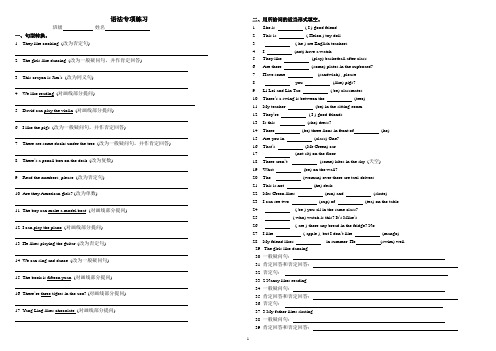
语法专项练习班级姓名一、句型转换。
1.They like cooking. (改为否定句)2.The girls like dancing. (改为一般疑问句,并作肯定回答)3.This crayon is Jim’s. (改为同义句)4.We like reading. (对画线部分提问)5.David can play the violin. (对画线部分提问)6.I like the pigs. (改为一般疑问句,并作否定回答)7.There are some ducks under the tree. (改为一般疑问句,并作肯定回答)8.There’s a pencil box on the desk. (改为复数)9.Read the numbers, please. (改为否定句)10.Are they American girls? (改为单数)11.The boy can make a model boat. (对画线部分提问)12.I can play the piano. (对画线部分提问)13.He likes playing the guitar. (改为否定句)14.We can sing and dance. (改为一般疑问句)15.The book is fifteen yuan. (对画线部分提问)16.There’re three tigers in the zoo? (对画线部分提问)17.Yang Ling likes chocolate. (对画线部分提问)二、用所给词的适当形式填空。
1.She is ( I ) good friend.2.This is ( Helen ) toy doll.3.( he ) are English teachers.4.I (not) have a watch.5.They like (play) basketball after class.6.Are there (some) plates in the cupboard?7.Have some (sandwich) , please.8.you (like) pigs?9.Li Lei and Lin Tao ( be) classmates.10.There’s a swing is between the (tree).11.My teacher (be) in the sitting-room.12.They’re ( I ) good friends.13.Is this (she) dress?14.There (be) three lions in front of (he).15.Are you in (class) One?16.That’s (Mr Green) car.17.(not sit) on the floor.18.There aren’t (some) kites in the sky. (天空)19.What (be) on the wall?20.The (woman) over there are taxi-drivers.21.This is not (he) desk.22.Mrs Green likes (run) and (skate).23.I can see two (cup) of (tea) on the table.24.( be ) you all in the same class?25.( who) watch is this? It’s Mike’s.26.( are ) there any bread in the fridge? No.27.I like ( apple ), but I don’t like (mango).28.My friend likes in summer. He (swim) well.29..The girls like dancing.30.一般疑问句:31.肯定回答和否定回答:32.否定句:33.2.Nancy likes reading.34.一般疑问句:35.肯定回答和否定回答:36.否定句:37.3.My father likes skating.38.一般疑问句:39.肯定回答和否定回答:140.否定句:41.4.David can play the violin.42.一般疑问句:43.肯定回答和否定回答:44.否定句:45.5.My sister can read a story.46.一般疑问句:47.肯定回答和否定回答:48.否定句:49.6.We can draw some pictures.50.一般疑问句:51.肯定回答和否定回答:52.否定句:53.1. What she like (do)?54.2. She (like) (play ) the piano.55.3. What you like (do)?56.4. Mrs Green likes___________ (swim) and___________ (dance).57.5. I like___________ (apple), but I don’t like_________ (banana).58.6. My friends_______ (like)___________ (swim) in summer.59.7. Yang Ling (not like) (swim).60.8. What are your (hobby)? I like (watch) films.61.9. I (not like) reading stories. But she (like).62.10. Do you like (go) and (run)?63.11. They can ( swim) (good).64.12. Can she (play) basketball?65.13. —Are there (some) rabbits in the zoo?—Yes, there are.66.14. Mr Green is good at (play) the piano.67.15. We all like (climb)the mountain very much.68.16. Let’s(go)shopping this afternoon.69.17. she (have) yellow shoes? —No, she doe sn’t.70.18. He (be )good at (make) flowers.71.19. Can you show (I)around your house?72.20. Don’t (shout)in the reading room.73.21. There (be) any books on the desk.74.22. They have big _____(body).75.23. It’s time_________ (have) dinner.76.24. The elephants have strong(强壮的)________ (foot)and big________ (leg).77.25. ________ Nancy _________(have)a parrot? No, she ________. (do)78.26. ________Mike and Liu Tao _______(have) any toys? No, they ________.(do )79.27. I _____ (be) good at Music. I can (play) the guitar. I like (play) the guitar.80.28.What fruit you like (eat)? I like _____(mango).81.29.How many (box) are there?There are 30.82.30.There (be) some milk and two glasses on the table.83.84.三.根据句意及首字母提示写出单词。
完整版)六年级英语语法填空专项练习
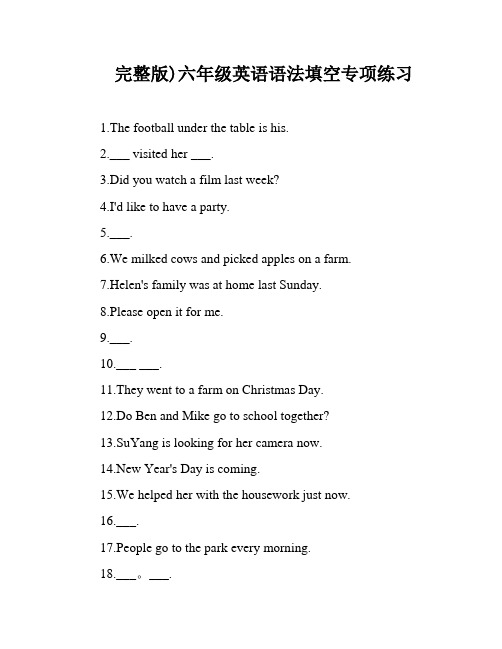
完整版)六年级英语语法填空专项练习1.The football under the table is his.2.___ visited her ___.3.Did you watch a film last week?4.I'd like to have a party.5.___.6.We milked cows and picked apples on a farm.7.Helen's family was at home last Sunday.8.Please open it for me.9.___.10.___ ___.11.They went to a farm on Christmas Day.12.Do Ben and Mike go to school together?13.SuYang is looking for her camera now.14.New Year's Day is coming.15.We helped her with the housework just now.16.___.17.People go to the park every morning.18.___。
___.19.Mike had a blue balloon and I had a green one.20.There is some bread on the plate。
May I have some?21.Let's clean the windows.22.When is his birthday?23.The children are ___.24.Ben usually has breakfast at seven in the morning.25.I was at school a moment ago。
but now I am at home.26.The girl visited Doctor Wang last month.27.Sunday is the first day of the week.28.Can you help her with the housework?29.___。
[必刷题]2024六年级英语上册语法结构专项专题训练(含答案)
![[必刷题]2024六年级英语上册语法结构专项专题训练(含答案)](https://img.taocdn.com/s3/m/3518fa590640be1e650e52ea551810a6f524c824.png)
[必刷题]2024六年级英语上册语法结构专项专题训练(含答案)试题部分一、选择题:10道1. Choose the correct answer to plete the sentence: "He_______ to the library every weekend." (A. go B. goes C. going)2. Which word is the past tense of "do"? (A. did B. do C. done)3. Choose the correct form of "be" in the sentence: "They _______ happy with their grades." (A. am B. is C. are)4. What is the opposite word of "big"? (A. small B. tallC. short)5. Which sentence is correct? (A. She like apples. B. She likes apples. C. She liking apples.)6. Choose the correct conjunction to plete the sentence: "I want to go to the park, _______ it's raining." (A. but B. and C. or)7. Which word is a plural noun? (A. cat B. dogs C. child)8. Which sentence uses the simple present tense correctly?(A. I am watch TV. B. I watches TV. C. I watch TV.)9. Choose the correct question word to plete the sentence: "________ do you go to school?" (A. How B. When C. Why)10. Which word is a verb? (A. run B. running C. runner)二、判断题:5道1. The word "jump" is a noun. ( )2. "She can sing and dance" is a pound sentence. ( )3. The past tense of "eat" is "eated". ( )4. "I am going to the movies" is in the simple past tense. ( )5. "They are playing basketball" is a correct sentence. ( )三、填空题:20道1. The present continuous tense is formed with thepresent tense of the verb "be" and the _______ form of the verb.2. "I _______ to the store yesterday" is an example ofthe past simple tense.3. The word "students" is the plural form of the noun_______.4. A verb that shows action is called an _______ verb.5. The opposite of "expensive" is _______.6. The correct question word to ask "What time?" is_______.7. "I am _______ a book" is the correct way to express reading in the present continuous tense.8. The past tense of "write" is _______.9. An adjective is a word that describes a _______.10. The correct form of "I" when it is the object of a verb is _______.11. "They _______ playing video games" is an example of the present continuous tense.12. The correct form of "have" to use with "I" is _______.13. The word "run" in "She likes to run" is a(n) _______.14. "Where is the _______?" is a question asking for a location.15. The correct form of "do" to use with "he" is _______.16. "I _______ to the park every Sunday" is an example ofa routine activity in the simple present tense.17. The word "friendly" is an example of an _______ adjective.18. The correct form of "be" to use with "it" is _______.19. "The cat is _______ the table" is an example of a prepositional phrase.20. "I _______ my homework last night" is the correct way to express pleting homework in the past.四、简答题:10道1. What is the difference between "I do" and "I am doing"?2. Write a sentence using the present perfect tense.3. What is an adverb and give an example.4. Explain the difference between "a" and "an".5. How do you form the past continuous tense?6. What is a gerund and how is it used in a sentence?7. Write a question using the future tense.8. What is the difference between "who" and "whom"?9. How do you form the parative form of an adjective?10. What is a pound sentence and give an example.本套试题答案如下一、选择题:10道1. B2. A3. C4. A5. B6. A7. B8. C9. B10. A二、判断题:5道1. ×2. √3. ×4. ×5. √三、填空题:20道1. ing2. went3. student4. action5. cheap6. What time7. reading8. wrote9. noun10. me11. are12. have13. verb14. library15. does16. go17. descriptive18. is19. on20. did四、简答题:10道1. "I do" is simple present tense, "I am doing" is present continuous tense.2. I have finished my dinner.3. An adverb modifies a verb, an adjective, or another adverb. Example: She sings beautifully.4. "A" is used before words that begin with a consonant sound, "an" is used before words that begin with a vowel sound.5. Subject + was/were + present participle6. A gerund is a verb form ending in ing that functions as a noun. Example: Reading is my favorite hob.7. Will you go to the party tomorrow?8. "Who" is used for the subject of a verb, "whom" is used as the object of a verb or preposition.9. Adjective + er or more + Adjective10. A pound sentence contains two or more independent clauses. Example: She likes to dance, and he likes to sing.。
小学六年级英语语法专项训练-人教版
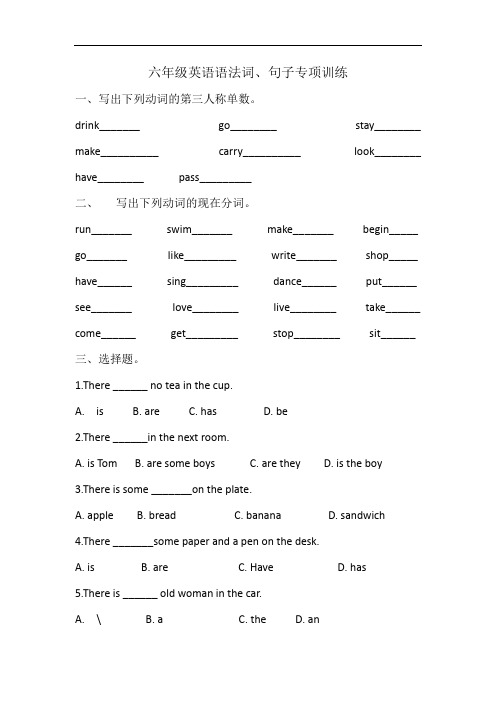
六年级英语语法词、句子专项训练一、写出下列动词的第三人称单数。
drink_______ go________ stay________ make__________ carry__________ look________ have________ pass_________二、写出下列动词的现在分词。
run_______ swim_______ make_______ begin_____ go_______ like_________ write_______ shop_____ have______ sing_________ dance______ put______ see_______ love________ live________ take______ come______ get_________ stop________ sit______三、选择题。
1.There ______ no tea in the cup.A. isB. areC. hasD. be2.There ______in the next room.A. is TomB. are some boysC. are theyD. is the boy3.There is some _______on the plate.A. appleB. breadC. bananaD. sandwich4.There _______some paper and a pen on the desk.A. isB. areC. HaveD. has5.There is ______ old woman in the car.A. \B. aC. theD. an四、用所给动词的正确形式填空。
1.The boy __________(draw) a picture now.2.Listen , some girls _________(sing)in the classroom.3.My mother_________(cook) some nice food now.4.What _____you______(do) now?5.Look. They _______(have) an English lesson.6.It____(be) Ben’s birthday last Friday.7.We all______(have)a good time last night.8.He _______(jump) high on last Sports Day.9.Helen_______(milk)a caw on Friday.10.She likes _____ newspapers, but she _______ a book yesterday.(read)11.Today is a sunny day .We ______(have)a picnic this afternoon.12.Tom often ________(go)to school on foot.But today is r ain. He _______ (go) to school by bike.13.LeiFeng often ________(help) others and he was helpful.14.Wha t _______his father usually _______(do) in the evening?15.Do you believe what he ______(say) just now?五、翻译句子。
小学英语六年级语法训练
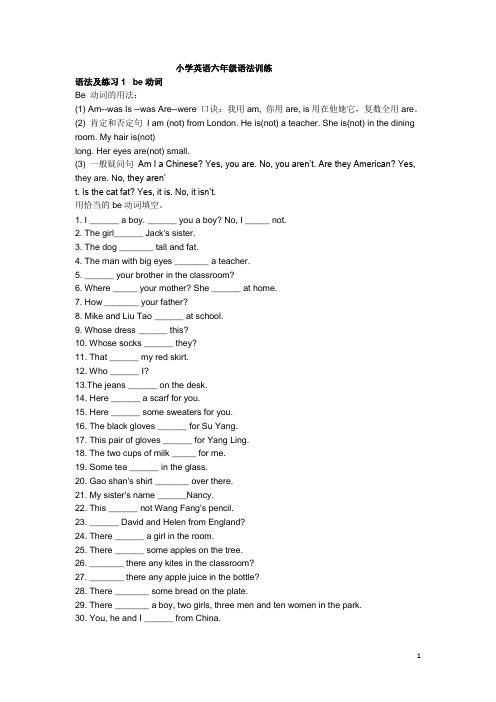
小学英语六年级语法训练语法及练习1 be动词Be 动词的用法:(1) Am--was Is --was Are--were 口诀:我用am, 你用are, is用在他她它,复数全用are。
(2) 肯定和否定句I am (not) from London. He is(not) a teacher. She is(not) in the dining room. My hair is(not)long. Her eyes are(not) small.(3) 一般疑问句Am I a Chinese? Yes, you are. No, you aren’t. Are they American? Yes, they are. No, they aren’t. Is the cat fat? Yes, it is. No, it isn’t.用恰当的be动词填空。
1. I ______ a boy. ______ you a boy? No, I _____ not.2. The girl______ Jack's sister.3. The dog _______ tall and fat.4. The man with big eyes _______ a teacher.5. ______ your brother in the classroom?6. Where _____ your mother? She ______ at home.7. How _______ your father?8. Mike and Liu Tao ______ at school.9. Whose dress ______ this?10. Whose socks ______ they?11. That ______ my red skirt.12. Who ______ I?13.The jeans ______ on the desk.14. Here ______ a scarf for you.15. Here ______ some sweaters for you.16. The black gloves ______ for Su Yang.17. This pair of gloves ______ for Yang Ling.18. The two cups of milk _____ for me.19. Some tea ______ in the glass.20. Gao shan's shirt _______ over there.21. My sister's name ______Nancy.22. This ______ not Wang Fang's pencil.23. ______ David and Helen from England?24. There ______ a girl in the room.25. There ______ some apples on the tree.26. _______ there any kites in the classroom?27. _______ there any apple juice in the bottle?28. There _______ some bread on the plate.29. There _______ a boy, two girls, three men and ten women in the park.30. You, he and I ______ from China.语法及练习2 人称代词和物主代词人称代词和物主代词1.人称代词主格和宾格的区别:主格通常位于句中第一个动词之前(有时候位于than 之后),宾格一般位于动词或介词之后。
(完整word)六年级英语语法专项练习试题
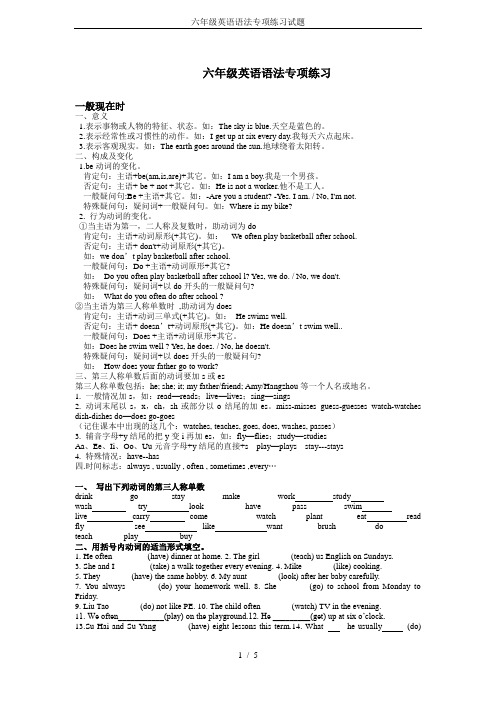
六年级英语语法专项练习一般现在时一、意义1.表示事物或人物的特征、状态。
如:The sky is blue.天空是蓝色的。
2.表示经常性或习惯性的动作。
如:I get up at six every day.我每天六点起床。
3.表示客观现实。
如:The earth goes around the sun.地球绕着太阳转。
二、构成及变化1.be动词的变化。
肯定句:主语+be(am,is,are)+其它。
如:I am a boy.我是一个男孩。
否定句:主语+ be + not +其它。
如:He is not a worker.他不是工人。
一般疑问句:Be +主语+其它。
如:-Are you a student? -Yes. I am. / No, I'm not.特殊疑问句:疑问词+一般疑问句。
如:Where is my bike?2. 行为动词的变化。
①当主语为第一,二人称及复数时,助动词为do肯定句:主语+动词原形(+其它)。
如:We often play basketball after school.否定句:主语+ don't+动词原形(+其它)。
如:we don’t play basketball after school.一般疑问句:Do +主语+动词原形+其它?如:Do you often play basketball after school l? Yes, we do. / No, we don't.特殊疑问句:疑问词+以do开头的一般疑问句?如:What do you often do after school ?②当主语为第三人称单数时,助动词为does肯定句:主语+动词三单式(+其它)。
如:He swims well.否定句:主语+ doesn’t+动词原形(+其它)。
如:He doesn’t swim well..一般疑问句:Does +主语+动词原形+其它。
小学六年级英语语法和专项练习
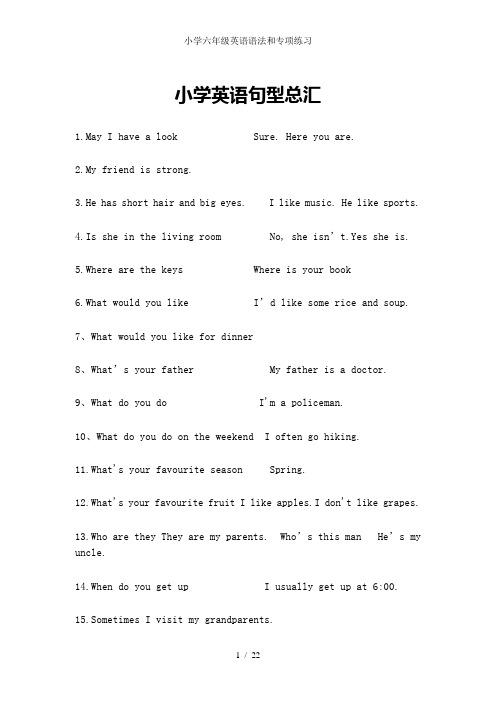
小学英语句型总汇1.May I have a look Sure. Here you are.2.My friend is strong.3.He has short hair and big eyes. I like music. He like sports.4.Is she in the living room No, she isn’t.Yes she is.5.Where are the keys Where is your book6.What would you like I’d like some rice and soup.7、What would you like for dinner8、What’s your father My father is a doctor.9、What do you do I'm a policeman.10、What do you do on the weekend I often go hiking.11.What's your favourite season Spring.12.What's your favourite fruit I like apples.I don't like grapes.13.Who are they They are my parents. Who’s this man He’s my uncle.14.When do you get up I usually get up at 6:00.15.Sometimes I visit my grandparents.16.Why do you like spring Because I can plant trees.17、Which season do you like best I like winter best.18、When is your birthday My birthday is in July.It's July 4th.19、When is Teachers' Day It's on September 10th.20、Who has a birthday in October Me.21.Is her birthday in June Yes.22.What's the date June 9th.23.What are you doing I'm drawing pictures.24.What is your father doing He's writing an e-mail.25.What do you see I see two elephants.26.What are they doing They are drinking water.27、What is Mike doing He's watching insects.28、Where are they They are in the woods.29、Are they catching butterflies No, they aren't.30、They are picking up leaves. Yes, they are.31.Where is Zhang Peng He's in the woods.32.Is he taking pictures Yes, he is. No, he isn't.He's playing chess.33.Who's your English teacher Mr Carter.34.What's he like He's tall and strong.35.Is she quiet No, she isn't.She's very active.36.What day is it today It's Wednesday.37、What do you have on Thursdays We have English, math and science on Thursdays.38、What do you do on Saturdays I watch TV on Saturdays.39、What do you have for lunch on Mondays We have tomatoes, tofu and fish.40、What can you do I can sweep the floor.41.Can you make the bed NO, I can't. Yes, I can.42.There are two bedrooms, a kitchen, a bathroom and a living room.43.There is a mirror, a bed and a big closet.44.Is there a forest in the park Yes, there is. No, there isn't.45.Are there any pandas in the mountains No, there aren't.46.Are there any fish in the rivers Yes, there are.47、Where is the canteen It's on the first floor.48、What time is it It's 5 o'clock.49、It's 6:30.It's time to go to school. It's time for English.50、What colour is it It's blue.51.Whose is it It's my T-shirt.52.What's the weather like in Beijing It's rainy today.53.Who’s that woman She’s my mother.54.Do you like peaches Yes, I do. No, I don’t.55.Nice to meet you. Nice to meet you, too.56.I have a bear.May I have a look Sure.Here you are.57、Where is the cinema It’s next to the hospital.58、Turn left at the cinema, then go straight.It’s on the left.59、What are you going to do on the weekend I’m going to visit my grandparents this weekend.60、Where are you going this afternoon I’m going to the bookstore.61.What are you going to buy I’m going to buy a comic book.62.What’s your hobby I like collecting stamps.63.Does she teach English No, she doesn’t. Yes, she does.64.What does your mother do She is a TV reporter.65.Where does she work She works in a car company.66.What should you do thenPEP语法汇总(一)不规则名词复数:man-men, woman-women, policeman-policemen,policewoman-policewomen, mouse-mice child-children foot-feet, tooth-teethfish-fish, people-people, Chinese-Chinese, Japanese-Japanese一、写出下列名词的复数形式:1.orange 2、class 3、text 4.piano 5.shelf 6.bed 7、co untry 8、family 9、toy10.foot 11.radio 12.photo13.tomato 14、fox 15.knife二、选择填空1.There on the wall .They are very beautiful.A.are photoesB.are photosC.is a photoD.is photos2. That is art book.A.anB.aC.the D are3.There some in the river.A.is ,fishB.are, fishsC.is, fishsD.are ,fish4.There two in the box.A.is watchB.are watchesC.are watchD.is watches5.We should clean twice a day.A .our tooth B.our tooths C.teeth D.our teethPEP语法汇总(二)写出下列动词的第三人称单数drink __________ go _________ stay __________ make __________look ___________ have_________ pass_________ carry __________ come__________ watch__________ plant_________ fly __________ study_________ brush__________ do___________ teach_________二、用括号内动词的适当形式填空。
英语语法练习:六年级上册
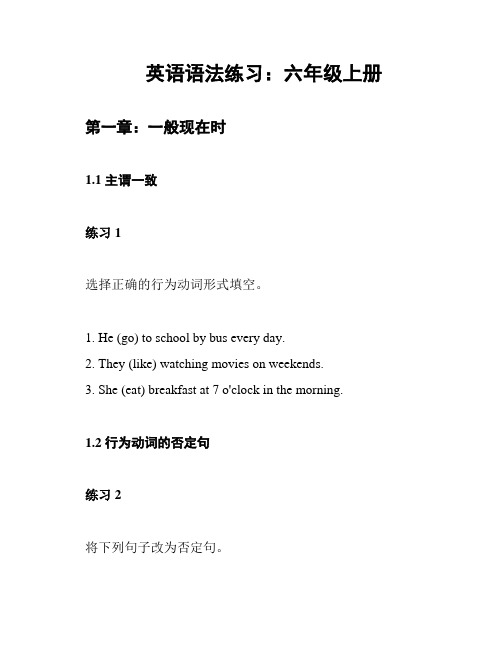
英语语法练习:六年级上册第一章:一般现在时1.1 主谓一致练习 1选择正确的行为动词形式填空。
1. He (go) to school by bus every day.2. They (like) watching movies on weekends.3. She (eat) breakfast at 7 o'clock in the morning.1.2 行为动词的否定句练习 2将下列句子改为否定句。
1. He goes to school by bus.2. They watch movies on weekends.3. She eats breakfast at 7 o'clock in the morning.1.3 行为动词的疑问句练习 3将下列句子改为疑问句。
1. He goes to school by bus.2. They watch movies on weekends.3. She eats breakfast at 7 o'clock in the morning. 第二章:一般过去时2.1 一般过去时的构成练习 4将下列句子改为一般过去时。
1. He goes to school by bus.2. They watch movies on weekends.3. She eats breakfast at 7 o'clock in the morning.2.2 一般过去时的否定句练习 5将下列句子改为一般过去时的否定句。
1. He went to school by bus.2. They watched movies on weekends.3. She ate breakfast at 7 o'clock in the morning.2.3 一般过去时的疑问句练习 6将下列句子改为一般过去时的疑问句。
1. He went to school by bus.2. They watched movies on weekends.3. She ate breakfast at 7 o'clock in the morning. 第三章:一般将来时3.1 一般将来时的构成练习 7将下列句子改为一般将来时。
六年级小学生英语语法知识点及练习题
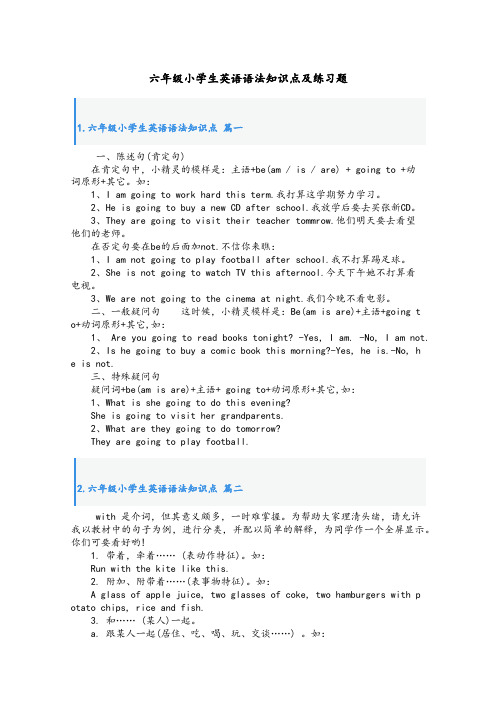
六年级小学生英语语法知识点及练习题1.六年级小学生英语语法知识点篇一一、陈述句(肯定句)在肯定句中,小精灵的模样是:主语+be(am / is / are) + going to +动词原形+其它。
如:1、I am going to work hard this term.我打算这学期努力学习。
2、He is going to buy a new CD after school.我放学后要去买张新CD。
3、They are going to visit their teacher tommrow.他们明天要去看望他们的老师。
在否定句要在be的后面加not.不信你来瞧:1、I am not going to play football after school.我不打算踢足球。
2、She is not going to watch TV this afternool.今天下午她不打算看电视。
3、We are not going to the cinema at night.我们今晚不看电影。
二、一般疑问句这时候,小精灵模样是:Be(am is are)+主语+going to+动词原形+其它,如:1、 Are you going to read books tonight? -Yes, I am. -No, I am not.2、Is he going to buy a comic book this morning?-Yes, he is.-No, he is not.三、特殊疑问句疑问词+be(am is are)+主语+ going to+动词原形+其它,如:1、What is she going to do this evening?She is going to visit her grandparents.2、What are they going to do tomorrow?They are going to play football.2.六年级小学生英语语法知识点篇二with 是介词,但其意义颇多,一时难掌握。
人教版(PEP)小学英语六年级语法专项练习:一般现在时【含答案】

A. not
B. don't
C. do
16.__________ he live in San Francisco now?
A. Is
B. Does
C. Did
17.They ______ big, but we _______ small.
A. are, are
B. is, are
C. are, am
A. is
B. am
C. are
7.Sometimes he _____books.
A. reading
B. reads
C. read
8.Does he _____newpers?
A. read
B. reads
C. reading
9.Lucy _____dinner at ten o'clock.
A. having
________
七、句型转换。
49.John wants to be a doctor .(改为一般疑问句) ________ 50.I would like some juice and eggs for breakfast. (对画线部分提问)________ 51.The juice is in the fridge. (对画线部分提问) ________ 52.We can climb the tree.(变为一般疑问句) ________ 53.Is it Wednesday?(作肯定回答)________ 54.The lesson goes on.(变为否定句)________ 55.Are they right?(作否定回答)________ 56.We have to start the story again.(变为否定句) ________ 57.Sam sees some drinks. (改为一般疑问句并做肯定回答) ________Sam see ________drinks? ________, he ________. 58.I have some bread and milk for breakfast.(对画线部分提问) ________ ________you ________ for breakfast?
六年级英语语法专项练习试题
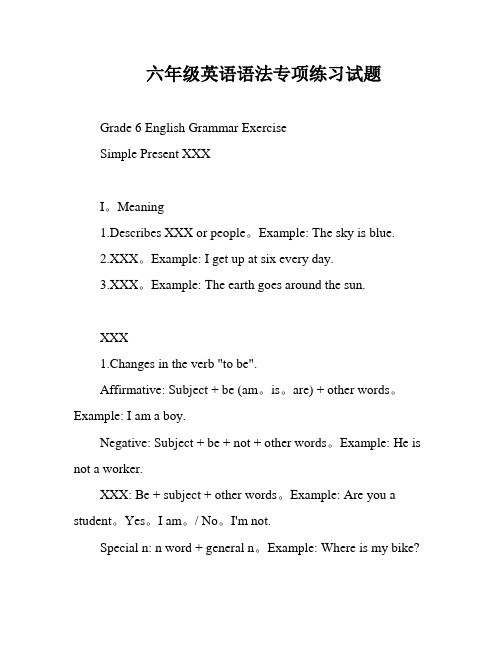
六年级英语语法专项练习试题Grade 6 English Grammar ExerciseSimple Present XXXI。
Meaning1.Describes XXX or people。
Example: The sky is blue.2.XXX。
Example: I get up at six every day.3.XXX。
Example: The earth goes around the sun.XXX1.Changes in the verb "to be".Affirmative: Subject + be (am。
is。
are) + other words。
Example: I am a boy.Negative: Subject + be + not + other words。
Example: He is not a worker.XXX: Be + subject + other words。
Example: Are you a student。
Yes。
I am。
/ No。
I'm not.Special n: n word + general n。
Example: Where is my bike?2.XXX.① When the subject is the first。
second person。
or plural。
XXX "do".Affirmative: Subject + verb (infinitive) (+ other words)。
Example: We often play basketball after school.Negative: Subject + don't + verb (infinitive) (+ other words)。
Example: We don’t play XXX.XXX: Do + subject + verb (infinitive) + other words。
六年级英语语法练习题40题含答案解析

六年级英语语法练习题40题含答案解析1.There are many _____ in the classroom.A.studentB.studentsC.student'sD.students'答案解析:B。
A 选项student 是单数形式,题目中many 后应接可数名词复数形式,所以A 错。
C 选项student's 是所有格形式,表示学生的,不符合题意。
D 选项students'也是所有格形式。
B 选项students 是复数形式,符合题意。
2.This is _____ book.A.LilyB.Lily'sC.LilysD.Lilys'答案解析:B。
A 选项Lily 是人名,不是所有格形式。
C 和D 选项形式错误。
B 选项Lily's 是所有格形式,表示莉莉的书,符合题意。
3.My _____ are on the table.A.penB.pensC.pen's答案解析:B。
A 选项pen 是单数形式,不符合题意。
C 和D 选项都是所有格形式,这里不需要所有格。
B 选项pens 是复数形式,符合题意。
4.The _____ are playing in the park.A.childB.childsC.childrenD.childrens答案解析:C。
A 选项child 是单数形式。
B 选项形式错误。
D 选项形式错误。
C 选项children 是child 的复数形式,符合题意。
5.That is my _____ bag.A.fatherB.father'sC.fathersD.fathers'答案解析:B。
A 选项father 是名词,不是所有格形式。
C 和D 选项形式错误。
B 选项father's 是所有格形式,表示父亲的包,符合题意。
6.There are some _____ on the desk.A.pencilB.pencilsD.pencils'答案解析:B。
六年级英语语法练习题40题带答案解析

六年级英语语法练习题40题带答案解析1.There are many ______ in our school library.A.bookB.booksC.a bookD.an book答案解析:B。
题干中“many”表示许多,后面跟可数名词复数形式,选项A 是单数形式,选项C 和D 中“a book”和“an book”都是单数形式,只有选项B 是复数形式,符合语法规则。
2.The teacher has two ______ on the desk.A.pencilB.pencilsC.a pencilD.an pencil答案解析:B。
“two”表示两个,后面跟可数名词复数形式,选项A 是单数形式,选项C 和D 中“a pencil”和“an pencil”都是单数形式,只有选项B 是复数形式,符合语法规则。
3.We can see some ______ on the playground.A.studentB.studentsC.a studentD.an student答案解析:B。
“some”表示一些,后面跟可数名词复数形式或者不可数名词,选项A 是单数形式,选项C 和D 中“a student”和“an student”都是单数形式,只有选项B 是复数形式,符合语法规则。
4.There is a ______ and two ______ in the classroom.A.teacher;studentB.teachers;studentsC.teacher;studentsD.teachers;student答案解析:C。
“a”后面跟可数名词单数形式,“two”后面跟可数名词复数形式,选项A 中第二个名词是单数形式,选项B 中第一个名词是复数形式,选项 D 中第二个名词是单数形式,只有选项 C 符合语法规则。
5.The students have many ______ to do after school.A.homeworkB.homeworksC.a homeworkD.an homework答案解析:A。
- 1、下载文档前请自行甄别文档内容的完整性,平台不提供额外的编辑、内容补充、找答案等附加服务。
- 2、"仅部分预览"的文档,不可在线预览部分如存在完整性等问题,可反馈申请退款(可完整预览的文档不适用该条件!)。
- 3、如文档侵犯您的权益,请联系客服反馈,我们会尽快为您处理(人工客服工作时间:9:00-18:30)。
六年级英语语法专项练习一般现在时一、意义1.表示事物或人物的特征、状态。
如:The sky is blue.天空是蓝色的。
2.表示经常性或习惯性的动作。
如:I get up at six every day.我每天六点起床。
3.表示客观现实。
如:The earth goes around the sun.地球绕着太阳转。
二、构成及变化1.be动词的变化。
肯定句:主语+be(am,is,are)+其它。
如:I am a boy.我是一个男孩。
否定句:主语+ be + not +其它。
如:He is not a worker.他不是工人。
一般疑问句:Be +主语+其它。
如:-Are you a student? -Yes. I am. / No, I'm not.特殊疑问句:疑问词+一般疑问句。
如:Where is my bike?2. 行为动词的变化。
①当主语为第一,二人称及复数时,助动词为do肯定句:主语+动词原形(+其它)。
如:We often play basketball after school.否定句:主语+ don't+动词原形(+其它)。
如:we don't play basketball after school.一般疑问句:Do +主语+动词原形+其它?如:Do you often play basketball after school l? Yes, we do. / No, we don't.特殊疑问句:疑问词+以do开头的一般疑问句?如:What do you often do after school ?②当主语为第三人称单数时,助动词为does肯定句:主语+动词三单式(+其它)。
如:He swims well.否定句:主语+ doesn't+动词原形(+其它)。
如:He doesn't swim well..一般疑问句:Does +主语+动词原形+其它。
如:Does he swim well ? Yes, he does. / No, he doesn't.特殊疑问句:疑问词+以does开头的一般疑问句?如:How does your father go to work?三、第三人称单数后面的动词要加s或es第三人称单数包括:he; she; it; my father/friend; Amy/Hangzhou等一个人名或地名。
1. 一般情况加s,如:read—reads;live—lives;sing—sings2. 动词末尾以s,x,ch,sh或部分以o结尾的加es。
miss-misses guess-guesses watch-watches dish-dishes do—does go-goes(记住课本中出现的这几个:watches, teaches, goes, does, washes, passes)3. 辅音字母+y结尾的把y变i再加es,如:fly—flies;study—studiesAa、Ee、Ii、Oo、Uu元音字母+y结尾的直接+s play—plays stay---stays4. 特殊情况:have--has四.时间标志:always , usually , often , sometimes ,every…一、写出下列动词的第三人称单数drink ________ go _______ stay ________ make ________ work studywash try look _________ have_______ pass_______ swimlive carry come________ watch______ plant_______ eat readfly ________ see like want_______ brush________ do_________teach_______ play buy二、用括号内动词的适当形式填空。
1. He often ________(have) dinner at home.2. The girl _______(teach) us English on Sundays.3. She and I ________(take) a walk together every evening.4. Mike _______(like) cooking.5. They _______(have) the same hobby.6. My aunt _______(look) after her baby carefully.7. You always _______(do) your homework well. 8. She _______(go) to school from Monday to Friday.9. Liu Tao _______(do) not like PE. 10. The child often _______(watch) TV in the evening.11. We often___________(play) on the playground.12. He _________(get) up at six o'clock.13.Su Hai and Su Yang _______(have) eight lessons this term.14. What_ _ he usually (do)after school?15.Amy (study) English,Chinese,Maths,Science and Art at school.16. Mike sometimes __________(go) to the park with his sister.17. At night, she __________(watch) TV with his parents.18. ________ Mike________(read) English every day?19.How_________she________(go)to work?20. Where_________your mother_________(work)?三、选择( )1.Amy TV everyday. A.watched B.watching C.watches( )2.I English. A.likes B.like C.liked( )3.I lots of shoes. A.have got B.there are C.has got( )4.She much bread..A.have B.there are C.has( )5.Amy and Daming often ball. A.play B.plays C.playing( )6.He to school every day.A.goes B.go C.went( )7.Daming his homework. every day. A.does B.do C.did( )8.Mr Black usually ___________ up early. A.gets B.get C.got( )1.Amy___ in an office. Her parents___in a hospital.A.work works B.works work C.work are working D.is working work( )2.The boys_____ a black hat. A have B there is C there are D has( )3.Wang Mei ____ music and often ____ to music. A.like; listen B.likes; listens C.like; are listening D.liking ; listen( )4.Daming____ English every evening. A.has study B.studies C.study D.studied( )5.The picture _______ nice. A.looks B.is looked C.look D.is looking( )6.John is always ______ Amy. A.help B.helping C.helps D.to help( )7.Tom is a worker. He _____ in a factory. His sister s _____ in a hospital.A.work/work B.works/ work C.work/ works( )8.MrLi _____ the windows every day. A.is cleaning B.clean C.cleans( )9.We___music and often___to music.A.like/listen B.likes/listens C.like/arelistening( )10.She _____ up at six in the morning. A.get B.gets C.getting( )20.Lin Tao ______ his new sweater. A.like B.liking C.likes四、翻译下列句子1、他喜欢画画。
___________________________________________________2、她在医院工作。
___________________________________________________3、我爸爸步行去上班。
___________________________________________________4、李磊经常在午饭后玩电脑游戏。
___________________________________________________一般过去时用法:表示过去已经发生的事情,通常用last过去“last week,上星期just now,刚刚yesterday昨天”in 1982,an hour ago一小时前last year去年⑴am 和is在一般过去时中变为was.(was not=wasn't)⑵are在一般过去时中变为were.(were not=weren't)last过去的意思1.主语+be(was,were)+名词2.主语+行为动词的过去式(+ed或其它)+其它1.一般在动词末尾加-ed,如:pull-pulled, cook-cooked 2.结尾是e加d,如:taste-tasted3.以“辅音字母+y”结尾的,变y为i,再加-ed,如:study-studied4.不规则动词过去式:am,is-was, are-were, do-did, see-saw, say-said, give-gave, get-got, go-went, come-came, have-had,eat-ate, take-took, run-ran, sing-sang, put-put, make-made, read-read, write-wrote, draw-drew,drink-drank, fly-flew, ride-rode, speak-spoke, sweep-swept, swim-swam, sit-sat,stop-stopped(一)、写出下列动词的过去式 .is\am_________ fly_______ plant________ are ________drink_________ play_______ go________make _______does_________ dance________ worry________ ask _____taste_________eat__________ draw________ put _____pass_______ do ________(二)、单项选择.( )1.They ______ young, then. A.are B.was C.were( )2.Your hair ____ so short, then. A.is B.was C.were( )3.Yesterday Amy ______ in the park and _______ to some friends. A.walk, talk B.walks,talks C.walked, talked.( )4.We ______ a watermelon yesterday. A.buy B.bought C.bughtC. DidB. Does )5.______ you cook meat yesterday? A. Do (( )6.He his homework yesterday. A.did B.doing C.do( )7.Were you ten? A.No, I didn't B.No, I wasn't C.No,I weren't( )8.Yesterday I Mum .But Sam help. A.helped;don't B.help;didn't C.helped;didn't( )9. the dog fat then?Yes,but it's thin now. A.Is B.Were C.Was( )10.We for a bike ride yesterday. A.go B.went C.goes( )11.The watermelon Daming's head yesterday. A.bumps B.bumped C.bumping( )12.Sam got a headache yesterday. A.have B.has C.had( )13.Did you watch TV?_______. A.Yes,I do. B.Yes,I didn't. C.No, I didn't.( )14.Did you help me clean my room ? Yes , I .A.did B.do C.does( )15.What did Lisa do yesterday? She to music .A.listens B.listen C.listened( )16.What did you do last weekend?I TV. A.saw B.looked at C.watched( )17.He into the lake and to it. A.jumped,swimed B.jump, swamC.jumped,swam( )18.Did John football yesterday?A.play B.played C.plaied( )19.They books last weekend .A.read B.readed C.look( )20.Did you swimming last weekend?A.go B.goes C.went一般将来时态表示将要发生的动作或存在的状态及打算、计划或准备做某事。
